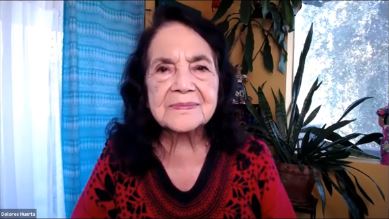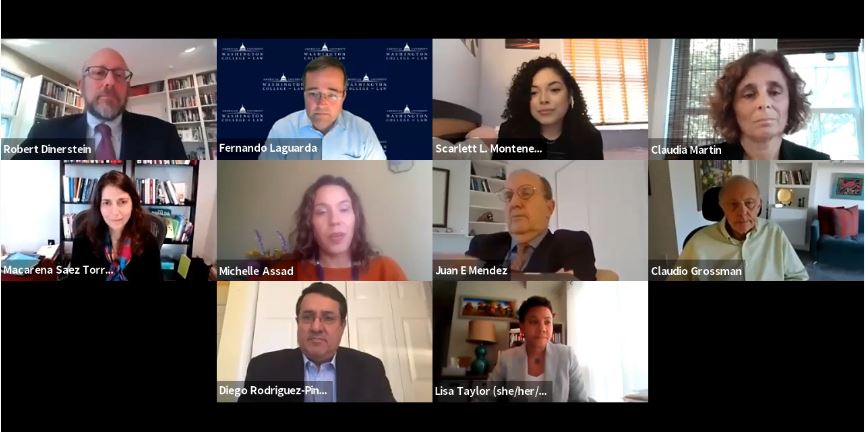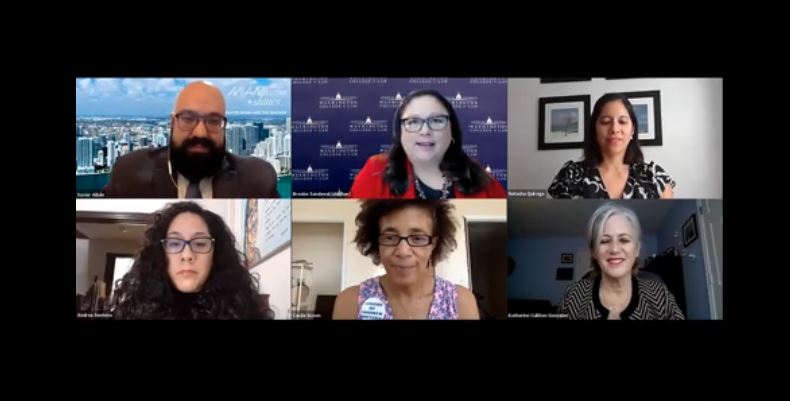AUWCL Hosts the 22nd Annual Hispanic Law Conference
Oct. 21, 2020
On Oct. 13-15, American University Washington College of Law presented the 22nd Annual Hispanic Law Conference, welcoming Latinx advocates, scholars, and leaders to a three-day virtual discussion on inclusion, voting, migrant rights, COVID-19, and more.
The regional conference – co-sponsored by the Hispanic Bar Association of the District of Columbia, Latin American Law Students’ Association (LALSA), and Latino/a Alumni Association of the Washington College of Law (LAAW) – began in 1997, and brings together a unique mix of leaders devoted to the advancement of and justice for the Latino/a community in the United States and abroad. M. Lucero Ortiz ’07, former board member of LAAW, served as chair of this year’s Conference Planning Committee.

Along with various panels on a myriad of topics, the event featured distinguished keynote speaker Dolores Huerta, founder and president of the Dolores Huerta Foundation. The labor, gender, social rights activist has been the recipient of the Eleanor Roosevelt Award for Human Rights, and received the Presidential Medal of Freedom from President Barack Obama.
Acting Dean Robert Dinerstein delivered welcoming remarks during the conference opening, calling the annual event “a distinct opportunity for our national and local Latino leaders, including members of the DC, Maryland, and Virginia Hispanic bars and Hispanic National Bar Association, to discuss key legal challenges facing the community and highlight exemplary models in the profession.”
Watch: Hispanic Law Conference, Day 1
Day one of the conference featured two panel discussions: “The Contributions and Response of WCL Latinos/as/xs to COVID-19 and Social Justice Movements,” moderated by Assistant Dean of Diversity Inclusion & Affinity Relations Lisa S. Taylor, and “(In/Ex)clusion in Latinx Communities: A Discussion on Diversity and Internal Racism” moderator by Cesar Francia, member of the Council on Foreign Relations.
“For education that is required to promote the rule of the law, the Latinx presence has been essential to make the law school what it is,” said AUWCL Dean Emeritus and Professor Claudio Grossman. “Together, we will continue to expand the diversity of our institution, to ensure compliance with our goals of providing scholars, lawyers, teachers, and practitioners for the 21st century.
Along with Grossman, faculty, staff, and student speakers included:
- Michelle Assad '13, Practitioner-in-Residence of Immigrant Justice Clinic
- Claudio Grossman, Dean Emeritus and Professor of Law
- Fernando Laguarda, Faculty Director of Program on Law & Government
- Claudia Martin, Co-Director of Academy on Human Rights & Humanitarian Law
- Juan Mendez, Professor of Human Rights Law in Residence
- Scarlett L. Montenegro, 2L Law Student
- Diego Rodriguez-Pinzon, Co-Director of the Academy on Human Rights and Humanitarian Law
- Macarena Saez, Faculty Director of the Center for Human Rights and Humanitarian Law
Assad told Taylor about the work the Clinic has done the past year in the light of social justice movements.
“The nationally ranked Clinic proudly represents its immigrant clients before state and federal courts, and federal agencies. Currently, we are fighting very hard and valiantly to support our neighbors and friends, colleagues and peers, who are immigrants,” Assad said.

“I’ve had to privilege of supervising and leading the new Defending the AU Dream Imitative…which expands our legal immigration services to university students in the DMV who need the legal advice and representation. The contribution of that program was monumental – we’ve helped these students with everything from securing green cards, to helping get citizenship, to helping them renew their DACA amid the instability of the DACA program itself.”
Day two of the conference featured a panel discussion on “Latino Communities Count: Census & Voting Rights in 2020,” moderated by Senior Counsel at Lawyers' Committee for Civil Rights Under Law Natasha Quiroga '07, and “Challenging U.S. Policy and Treatment of Migrants and Asylum Seekers from an International Human Rights Lens,” moderated by Assistant Deputy Director and Counsel to New York City Council M. Indiana Porta '11.
Andrea Senteno '13, regional counsel for the Mexican American Legal Defense and Educational Fund (MALDEF), said when it comes to the census it has been a tumultuous few years.
Watch: Hispanic Law Conference, Day 2
“Multiple organizations had brought litigation in 2018 and into 2019 challenging the administration’s efforts to add a citizenship question to the census, an issue that quickly went up the Supreme Court – the decision in Commerce v. New York in 2019 struck down the efforts to add that question,” Senteno said. The motivation behind such efforts are clear, she added.
“It is to dissuade communities of color and immigrant communities from participating in a complete count, and to find a way to get information that can be used to harm communities of color, specifically Latinos and others who have been traditionally underrepresented. They are aware that the demographics of this country are rapidly changing, and the Latinos are growing not just as population base, but as a voting block.”
The conference concluded on day three with panel discussion “The Impact of COVID-19 on Latino/a Communities,” moderated by Saez, and a keynote address from Huerta.

In 1962, Huerta and Cesar Chavez founded the United Farm Workers union. She served as vice president and played a critical role in many of the union’s accomplishments for four decades. In 2002, she received the Puffin/Nation $100,000 prize for Creative Citizenship, which she used to establish the Dolores Huerta Foundation. The Foundation works to connect groundbreaking community-based organizing to state and national movements to register and educate voters; advocate for education reform; bring about infrastructure improvements in low-income communities; advocate for greater equality for the LGBT community; and create strong leadership development.
“I look back on my life and I can think of the positive changes that have been accomplished,” Huerta said, when asked how she remains positive. “I know that democracy works when people work hard at making something happen, they stay together, they take the right action. We can make improvements, even though we have setbacks and people trying to take away those achievements from us.”
Watch: Hispanic Law Conference, Day 3
A lot of key changes, Huerta said, comes down to voting.
“Ultimately, the only way we can make permanent change is by making sure that whatever change we want is institutionalized and put in the form of legislation. It’s got to be a law that can implemented and enforced and people have to be held accountable,” she said. “That’s what inspires of me that we can make this happen, and it starts at the bottom – talking to people and helping them understand the issues, and how they can get involved and make those changes. When people really understand the power to make change, it’s like finding a pot of gold at the end of the rainbow, because our lives can become so much richer.”
Awardees honored during the annual Hispanic Law Conference Awards Ceremony include:
Premio Inspiración:
William E. Chavez, graduating J.D. student
Goldman-Grossman Award:
Cristian Franco Cortes, graduating LL.M. student
Edward Bou Alumni Award:
Cori Alonso-Yoder, Professor of Law, Georgetown University Law Center and Director of the Federal Legislation Clinic
Premio Solidaridad:
Monica Palacio, Former Director of the District Office of Human Rights (OHR) and Candidate for D.C. Council At-Large Seat